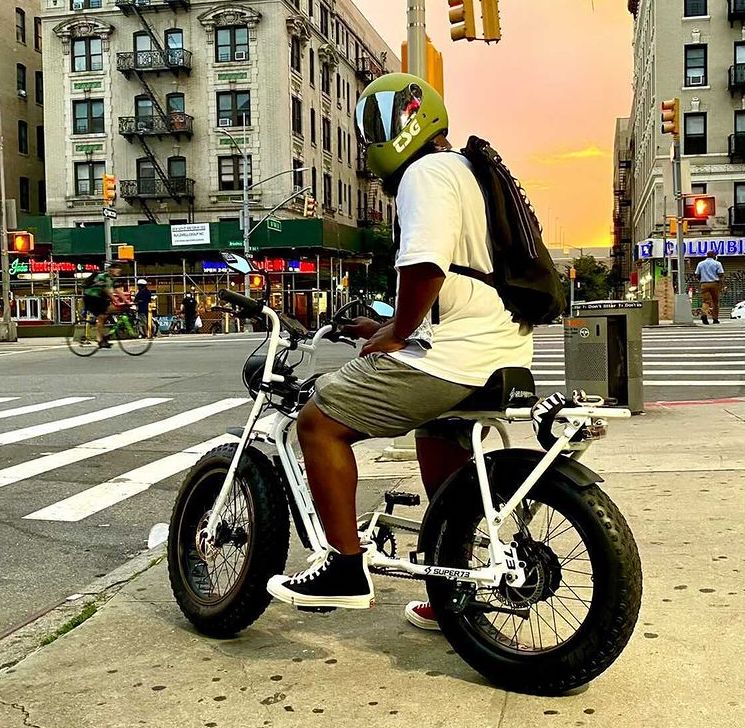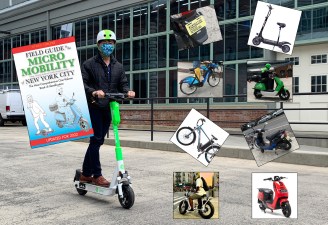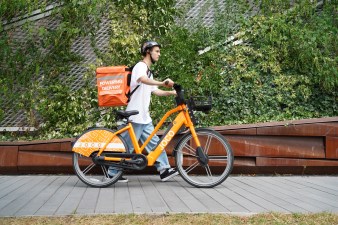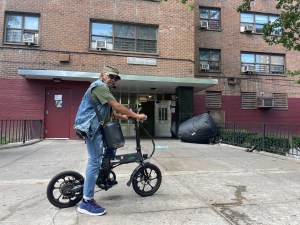The PATH Train Just Quietly Banned E-Bikes at All Times

The short-sighted e-bike crackdown continues.
Starting on July 1, cyclists whose bikes include battery-powered motors will no longer be allowed to transport those bikes on the Port Authority’s PATH trains between Manhattan and New Jersey — a change in policy that was quietly announced in a tweet on Friday afternoon, June 11, before the agency went silent and refused to answer any questions about it.
First, the tweet:
PATH rules for bike, scooter & skateboard users
? Folded bikes permitted all times
? Non-folding bikes permitted all times EXCEPT M-F 6:30-9:30a & M-F 3:30-6:30p
?? Starting 7/1 electric bikes not permitted. (Electric scooters & electric skateboards already not permitted.) pic.twitter.com/snnn8m6pao— PATH Train (@PATHTrain) June 11, 2021
In a subsequent tweet, an unidentified PATH official claimed that the lithium batteries that power electric bikes are dangerous, and the new policy expands on an existing 2018 ban on other forms of electric mobility. It is true that lithium batteries must be properly handled, but incidents with them are exceptionally rare. According to Lyft, which operates 4,000 electric Citi Bikes in New York, customers have taken 7.4 million rides (nearly 15.7 million miles) on the company’s lithium-powered e-bikes with not a single fire or explosion.
There was a fire in 2019 at a Citi Bike plant where batteries are charged en masse, but that blaze may have been sparked by a test of how much charge a battery could take. And two electric bikes in San Francisco apparently caught fire in 2019 as well, though the cause of those fires were also unclear, and may have been vandalism.
The unidentified PATH official also claimed that electric bikes are bigger than standard bikes, though that is not generally accurate. (Under additional questioning from Streetsblog and members of the public, the agency vaguely tweeted on Wednesday that it may be reconsidering its ban plan: “Thanks for your feedback on our earlier post about #ebikes. We’re listening and working with our partners and biking community to review our current rules surrounding motorized vehicles on PATH. We’re committed to developing a strategy that works best for all customers.”)
Whatever the Port Authority’s motivations, they don’t match the main transit agency in the area: The MTA does not ban e-bikes on any of its rail systems (though all bike riders need a once-per-lifetime $5 permit). Amtrak also allows all bikes under a certain weight (on its routes that allow bikes, that is). NJ Transit appears to have an e-bike restriction.
Cycling advocates were also quick to point out the implications for workers who either need their bike for their job or to get to their jobs in areas unserved by the pokey PATH.
The safety of our riders remains a top priority. Prohibiting e-bikes, which aligns w/our 2018 rule change prohibiting electric scooters & electric skateboards, addresses the lithium batteries powering them. E-bikes are also larger and we must maximize our onboard train space. *AC
— PATH Train (@PATHTrain) June 14, 2021
“It definitely creates a hassle for delivery workers,” said one cycling activist who requested anonymity because of dealings with government. “Many of them use the PATH train to get to New York for work and they need their bike.”
And e-bike riders were especially appalled.
“I think it’s dumb,” said Rasheed Ingram, a videographer who commutes on the PATH train with his electric bike every day. “We still need to get back and forth to the city, and how else are we supposed to get there?”
Ingram said that he observes the peak-hour bike bans, but rarely encounters a crowded train during non-rush-hour periods.
“As long as you follow the rule of not getting on at those peak hours I feel like you’re fine,” he said. “Like right now, it’s completely empty, just me and a couple other people.”
Ingram said he would likely be forced to take a ferry from New Jersey to New York, which is more expensive.
Another e-mobility user, who declined to give her name, also thought the ban was “nonsense.”
“They take up the same space as regular bikes or strollers, sometimes less,” she said. “With my scooter, I take up so little space that it really doesn’t make sense to me.”
The plan to ban e-bikes on PATH trains follows a growing and alarming backlash to this particular form of transportation. Earlier this month, the transportation committee of Community Board 7 on Manhattan’s Upper West Side demanded that the city ban electric bikes in bike lanes — a request that Mayor de Blasio dismissed out of hand because it would put e-bike riders (including Citi Bike riders) in traffic, where they can easily be maimed or killed.
Later, all the top candidates in the June 22 Democratic mayoral primary were asked if they support licensing of e-bikes, which is a third rail to most cycling advocates because registration would reduce cycling, and therefore the well-documented strength in numbers affect, making each remaining cyclist that much more unsafe.
Advocates for electric bikes see the current backlash as misguided for a coastal city whose survival in large part depends on commuters around the world shifting from high-pollution modes of transportation such as cars to much-more sustainable modes such as electric bikes, whose range, cost and power make them a logical alternative to the car for most commuters.
“Why are we talking about restricting a safe, green, and wildly popular form of transportation when we’re in the middle of a climate change-induced heat wave and seeing traffic soar? Let’s move on to more serious issues,” Caroline Samponaro, the head of Transit, Bike and Scooter Policy for Lyft, recently told Streetsblog.
Cracking down on e-bikes is “a recipe for congestion, carmageddon, and criminalization,” added Cory Epstein, the spokesman for Transportation Alternatives.
“The real problem,” Epstein added, “is cars that inefficiently hog our street space. Taking space from cars to build better bike lanes will do a whole lot more for safety than throwing police resources at immigrant delivery workers who kept us fed us through the pandemic.”
— with Gersh Kuntzman





